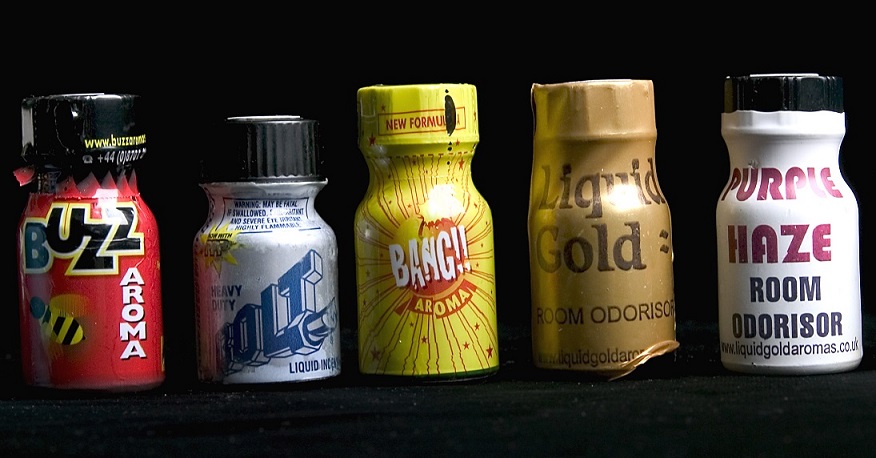
Sydney cases prompt link between permanent eye damage and amyl use

A NUMBER of recent cases involving permanent eye damage may be linked to use of amyl nitrate, or “poppers”, according to a Sydney eye specialist.
Dr Michael Chilov at the University of Sydney noticed a number of patients with both temporary and permanent eye damage causing gradual vision loss, which he linked to patients’ heavy use of amyl nitrate.
Although illegal to sell for inhalation purposes, amyl nitrate is widely available in Australia, often sold in adult stores as “vinyl cleaner”, “DVD cleaner” or incense, and is commonly used in the gay community to enhance sex.
Chilov hadn’t been aware of any connection between amyl nitrate use and eye damage, but looked into it after seeing cases come through his clinic.
“I had a spate last year — I think I had four cases within about three months of patients with this problem, they’d been using amyl and they’d come in with acute vision loss after the fact,” he told the Star Observer.
“I had one guy who’d used them for the first time and woke the next morning with a bright spot in the centre of his vision in both eyes, and he made the connection himself. Then there was another one that came not long after that, and then I became very aware of it.”
There are reports of isolated incidents relating eye damage to amyl nitrate use going back years, but no large-scale research on a possible connection.
Most reported instances in medical journals involve extremely heavy use, or use in conjunction with other heavy substance use, or even use while staring at strong light sources, with researchers acknowledging the inability to make any broad claims based on these cases.
Chilov stressed it was only a minority of amyl nitrate users who were experiencing eye damage, but said the lack of information around why that was the case indicates the need for further research.
“There are thousands and thousands of uses, probably every day, yet even a specialist like myself would only see a handful of these cases,” he said.
“It’s clearly something else that predisposes someone to having eye damage following popper inhalation.”
Chilov also pointed to some suggestions by researchers in Europe that changes to European law banning certain formulations of poppers and leading to new substances being sold for the same purpose could be to blame for increased cases. Many brands of amyl nitrate sold in Australia are imported from Europe.
Dr Steven Bright, coordinator of the addictions program at Curtin University, cautioned against drawing too strong a link between amyl nitrate use and eye damage, reiterating Chilov’s point about the very small number of cases.
“Anecdote isn’t evidence… but I think this is some important findings, and what it needs to lead to is some research to investigate it further,” he told the Star Observer.
“On top of that the point is that the cases that have been identified have been associated with a particular type of amyl, which has hit the market because of a ban on the earlier version of amyl nitrate.”
Bright suggested amyl nitrate users take these cases of eye damage into account when considering how and how often they use the drug.
“Maybe it’s around limiting use, so rather than saying ‘don’t use amyl nitrate’, minimising use where you can, particularly binge use,” he said.
“Some people might be more likely than others to experience those problems, so for first-time users, maybe start off with a very small dose, or certainly not bingeing on it, just in case you do have that predisposition.”
ACON chief executive Nicolas Parkhill echoed the calls for further research into a possible link between amyl nitrate use and eye damage, but also pointed to the scarcity of existing literature on cases of vision loss.
“Some of the individuals in these reported cases were frequent (daily) users of amyl,” he told the Star Observer.
“While the biological cause of such damage is yet to be identified, it may be associated with some of the chemicals in amyl, but may also be associated with staring at strong light sources while using amyl.”
“It should be noted that such cases are exceedingly rare, but may indicate that less drastic (more subtle) damage may be associated with the use of amyl which has not been reported in the medical literature. This suggests that more research needs to be undertaken in this area.”
Parkhill also reminded amyl nitrate users of established risks associated with the drug, notably when it is mixed with Viagra.
The combination can induce heart attacks, and has also been linked to stroke.
“It is best to avoid mixing these two drugs,” Parkhill said.
“If you are using Viagra, either don’t have an amyl bottle with you or let your sex partners know at the outset that you do not want to use amyl.”
If you are concerned about your substance use, contact your local AIDS council, your GP or a drug and alcohol service.










Yes they are nitrites, and I’m not surprised to see them demonized once again. In the early 80s, they were blamed for causing the ‘gay cancer’ later termed AIDS. Interesting hypothesis here, but let’s find subjects and test it at bodyline binging on amyl and reading vision charts.
It’s worth considering that the problem may not be the amyl nitrite itself but a harmful contaminant present in the amyl. One chemical that comes to mind is methanol, present in the cheap and widely available methylated spirits, known to cause vision problems.
An example of a research paper showing popper’s effects on users eyes is here but it is all about nitrites not nitrates:
http://www.researchgate.net/publication/49835947_Foveal_damage_in_habitual_poppers_users
Amyl nitrate is relatively inactive and most certainly is not the chemical they are talking about. All the bottles in the picture above contain 70% isopropyl nitrite. Check the little bottle people or their websites and you will most likely find its ingredient is listed as alkyl nitrite and as alkyl is a group type designation, the product could be amyl nitrite or propyl nitrite but it will not be a nitrate. Check the poppers research too and you will find it is all about nitrites not nitrates. I think this is right time to discard slang and embrace the right chemical.